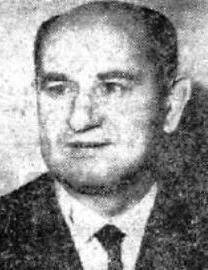Mika Špiljak
This is an old revision of this page, as edited by KasparBot (talk | contribs) at 17:01, 15 March 2016 (migrating Persondata to Wikidata, please help, see challenges for this article). The present address (URL) is a permanent link to this revision, which may differ significantly from the current revision.
Mika Špiljak | |
|---|---|
 | |
| 6th President of the Presidency of Yugoslavia | |
| In office 15 May 1983 – 15 May 1984 | |
| Prime Minister | Milka Planinc |
| Preceded by | Petar Stambolić |
| Succeeded by | Veselin Đuranović |
| 2nd Member of the Presidency of Yugoslavia for SR Croatia | |
| In office January 1983 – 15 May 1984 | |
| Preceded by | Vladimir Bakarić |
| Succeeded by | Josip Vrhovec |
| President of the Council of Peoples of the Federal Assembly | |
| In office 1969–1974 | |
| Succeeded by | Post abolished |
| 25th Prime Minister of Yugoslavia | |
| In office 16 May 1967 – 18 May 1969 | |
| President | Josip Broz Tito |
| Preceded by | Petar Stambolić |
| Succeeded by | Mitja Ribičič |
| 4th Prime Minister of Croatia | |
| In office June 1963 – May 1967 | |
| President | Jakov Blažević |
| Prime Minister | Dragutin Haramija |
| Preceded by | Zvonko Brkić |
| Succeeded by | Savka Dabčević-Kučar |
| 10th President of the League of Communists of Croatia | |
| In office 1984–1986 | |
| President | Jakša Petrić Pero Car Ema Derossi-Bjelajac |
| Prime Minister | Ante Marković Ema Derossi-Bjelajac |
| Preceded by | Josip Vrhovec |
| Succeeded by | Stanko Stojčević |
| 32nd Mayor of Zagreb | |
| In office 1945–1949 | |
| Preceded by | Eugen Starešinić |
| Succeeded by | Milivoj Rukavina |
| Personal details | |
| Born | (1916-11-28)28 November 1916 Odra Sisačka (part of Sisak), Kingdom of Croatia-Slavonia, Austria-Hungary |
| Died | 18 May 2007(2007-05-18) (aged 90) Zagreb, Croatia |
| Nationality | Croatian |
| Political party | League of Communists of Yugoslavia (SKJ) |
Mika Špiljak (Serbo-Croatian pronunciation: [mîka ʃpîʎak] or [-ʃpîʎaːk]; 28 November 1916 – 18 May 2007) was a Croatian politician in the Socialist Federal Republic of Yugoslavia.
He was born in Odra Sisačka (part of Sisak), in the Kingdom of Croatia-Slavonia (present-day Croatia). His father Dragutin was a railway worker. Špiljak began working at the age of 16. He joined the Communist Party in 1938 and fought with Partisans during World War II.
From 1945 to 1949, he was the mayor of Zagreb.
In 1963, Špiljak was appointed the Chairman of the Executive Council of Croatia and served until his 1967 appointment as the President of the Federal Executive Council, Yugoslavia's Prime Minister. He served in that capacity until 1969.
Špiljak then served as Chairman of the Collective Presidency of Yugoslavia from 1983 until 1984. He was subsequently appointed as the Secretary of the Central Committee of the League of Communists of Croatia from 1984 until 1986.
He died in 2007 at the age of 90. [1] He was cremated in Zagreb.[2]
In the 2000s (decade), German courts linked Špiljak to the assassination of Croatian emigrant Stjepan Đureković in 1983.[3]
References
| Political offices | ||
|---|---|---|
| Preceded by | President of the Presidency of Yugoslavia 15 May 1983 – 15 May 1984 |
Succeeded by |
| Preceded by | President of the Federal Executive Council of Yugoslavia 16 May 1967 – 18 May 1969 |
Succeeded by |
| Preceded by | President of the Executive Council of Croatia June 1963 – May 1967 |
Succeeded by |
| Preceded by | Mayor of Zagreb 1945–1949 |
Succeeded by |
| Party political offices | ||
| Preceded by | President of the Presidency of the Central Committee of the League of Communists of Croatia 1984 – 1986 |
Succeeded by |
1st Executive Council of the People's Republic of Croatia (1953) | |
|---|---|
|
Members of the Presidency of the Socialist Federal Republic of Yugoslavia (1979–1984) | |
|---|---|
| |
| Members ex officio as President of the Presidency of the Central Committee of the League of Communists of Yugoslavia |
|
Members of the Presidency of the Socialist Republic of Croatia (1982–1986) | |
|---|---|
| |
| Members ex officio as President of the Presidency of the Central Committee of the League of Communists of Croatia |
|
Leadership of the Socialist Federal Republic of Yugoslavia (May 1984 - May 1985) | |
|---|---|
| President of the Presidency | Federal Veselin Đuranović
Republic |
| President of the Executive Council | Federal Milka Planinc
Republic |
| President of the Presidency of the Central Committee of the League of Communists | Federal Ali Shukriu
Republic |
| |||||||||||
| |||||||||||
| |||||||||||
|
Preceded by Presidents of the Executive Council of SR Croatia (1945–1990) | |
| Following the first multi-party elections (1990–1991) | |
| Since independence (1991–) | |
| ||||||||||||||||||||||||||||||||||||||
| ||||||||||||||||||||||||||||||||||||||
| ||||||||||||||||||||||||||||||||||||||
| ||||||||||||||||||||||||||||||||||||||
| ||||||||||||||||||||||||||||||||||||||
| ||||||||||||||||||||||||||||||||||||||
| ||||||||||||||||||||||||||||||||||||||
| ||||||||||||||||||||||||||||||||||||||
| ||||||||||||||||||||||||||||||||||||||
- 1916 births
- 2007 deaths
- People from Sisak
- People from the Kingdom of Croatia-Slavonia
- League of Communists of Croatia politicians
- Presidents of the Federal Executive Council of Yugoslavia
- Presidents of the Executive Council of the Socialist Republic of Croatia
- Mayors of Zagreb
- Recipients of the Order of the People's Hero
- Presidency of the Socialist Federal Republic of Yugoslavia members





